Through the B.O.L.D. 2026 initiative, Advocacy KAPS Council, the Jefferson County Business Lobby (JCBL), and consistent outreach to elected officials at all levels of government, the Arvada Chamber strives to stay informed on the latest policy developments while advocating for a strong local economy.
This year, Arvada ballots will include federal, state, and county elections, as well as several propositions. We encourage our local business community to review the below outlined information and determine the impacts for your business.
Included in this guide:

- State Senate – D19 (Lindsey Daugherty and Sam Bandimere)
- State House – D24 (Gwen Henderson and Lisa Feret)
- State House – D27 (Brianna Titone and Ed Cox)
- Jefferson County Commissioner – D1 (Charlie Johnson, Rachel Zenzinger, and Eric Bodenstab)
- Jefferson County Commissioner – D2 (Andy Kerr and Natalie Menton)
THE ISSUES
Proposition 131: Top-Four Ranked-Choice Voting Initiative
Prop. 131 would significantly change how Colorado’s primary and general elections are conducted for many offices. It would replace single-party primaries with “all-candidate” primaries. It would also introduce ranked-choice voting for general elections in November.
If Prop. 131 is approved, instead of having a Democratic primary and a Republican primary to select each party’s official candidates, all qualified candidates would be listed on a single primary ballot. Voters would select their single preferred candidate from the broader field.
A “yes” vote supports establishing top-four primary elections and ranked-choice voting for U.S. Senate, U.S. House of Representatives, governor, attorney general, secretary of state, treasurer, Colorado University board of regents, state board of education, and state legislature.
A “no” vote opposes this initiative, thereby maintaining semi-closed primaries and plurality vote single-winner general elections for U.S. Senate, U.S. House of Representatives, governor, attorney general, secretary of state, treasurer, Colorado University board of regents, state board of education, and state legislature.
Arguments For
Proposition 131 could foster a more balanced political environment, potentially benefiting the business community. By implementing an open primary and ranked choice voting system, this measure may encourage the election of more moderate candidates who are open to compromise. This could lead to a less polarized legislative landscape, making it easier for businesses to advocate for their interests and collaborate with policymakers. The Colorado Chamber of Commerce supports Proposition 131, recognizing that political division and extremism can impede progress and collaboration. By expanding voter choice, this measure may reduce polarization that often results in unfavorable policies for businesses. A more balanced political environment could lead to more predictable and business-friendly legislation, creating a stable climate for economic growth and investment.
Arvada Chamber “All About the Ballot Webinar” | 131 Support Argument
Arguments Against
Implementing Proposition 131 could create significant challenges for businesses, particularly in the short term. The complexity of the new voting system may lead to delayed election results and potential confusion, which could create uncertainty in the business environment. This uncertainty might affect decision-making processes and investment plans for companies operating in Colorado. Additionally, the costs associated with implementing this new system could potentially lead to increased taxes or reduced government services, indirectly affecting businesses4. The measure’s implementation timeline is also uncertain due to legislative barriers, which could prolong the period of adjustment and uncertainty for the business community3. Some argue that Colorado’s current election system is already effective, and such a significant change may not be necessary or beneficial for the state’s economic stability.
Resources:
- CPR News: Proposition 131: All party primaries and ranked choice voting, explained
- Colorado Sun Overview
- [Podcast] Freakonomics: Why Don’t We Have Better Candidates for President?
Jeffco 1A: Revenue Retention
Ballot Measure 1A asks voters to allow Jefferson County to retain all its current property tax revenues, eliminating the revenue cap set by the Taxpayer’s Bill of Rights (TABOR). This measure does not increase taxes or the mill levy rate but instead permits the county to keep approximately 24 cents per dollar it already collects for designated projects.
Arguments For
Jeffco Ballot Measure 1A would allow the county to retain funds it already collects without increasing taxes or mill levy rates. This additional revenue could support critical areas such as public safety, transportation infrastructure, and mental health services, which have faced budget cuts in recent years. The measure could potentially address understaffing issues in law enforcement, possibly leading to reduced response times and improved community safety. Funds could be directed towards road repairs and transportation infrastructure, benefiting residents and businesses. The measure includes provisions for fire and flood mitigation, which could enhance disaster preparedness. Accountability measures, including annual independent audits and a citizens advisory committee, are built into the proposal to oversee fund usage. By investing in county services and infrastructure, the measure might create a more attractive environment for businesses and residents, potentially stimulating the local economy. It could also help the county better address the needs of a growing population without increasing the tax burden on individual residents.
Arvada Chamber “All About the Ballot Webinar” | 1A Support Argument
Arguments Against
While Jeffco Ballot Measure 1A doesn’t directly increase taxes, it would eliminate future tax refunds, which some view as an effective tax increase over time. The measure would modify the restrictions set by the Taxpayer’s Bill of Rights (TABOR), which was designed to limit government growth and protect taxpayers. Critics argue that this approach doesn’t address potential inefficiencies in current spending practices. Despite specified allocations, there’s no absolute guarantee that future county leadership would use the funds exactly as currently proposed. In challenging economic times, this measure prioritizes government revenue retention over potential taxpayer refunds. Removing revenue limits could potentially lead to less stringent budgeting practices. If approved, this could set a precedent for similar requests from other taxing entities. Some argue that the county hasn’t fully explored alternatives such as operational efficiencies or targeted, time-limited tax measures for specific projects. Unlike some tax measures with expiration dates, this change would be permanent, indefinitely altering the current taxpayer protection framework.
Arvada Chamber “All About the Ballot Webinar” | 1A Opposition Argument
Arvada Chamber Position: SUPPORT
Rationale: The Arvada Chamber of Commerce supports Jefferson County Ballot Measure 1A due to its potential to significantly enhance public safety, a top concern for Arvada businesses, and its focus on wildfire mitigation, which could lead to reduced insurance costs and improved business continuity. By allowing Jefferson County to retain approximately $30 million in annual revenue without raising taxes, the measure will fund crucial initiatives in crime prevention, emergency response, and natural disaster mitigation. These investments not only create a safer environment for businesses to operate but also potentially decrease financial risks associated with wildfires and crime. The measure’s commitment to fiscal responsibility, including annual audits and citizen oversight, ensures that funds will be used effectively. Supporting Measure 1A represents an investment in the long-term stability and prosperity of our local business community, addressing critical needs without placing additional tax burdens on businesses.
7A: Keep Colorado Moving
By voting yes on 7A, voters will allow RTD (the Denver region’s transit agency) to keep the revenue they raise to keep transit moving. Every year, RTD raises about $600 million from a .6% sales tax. That money pays for the trains and buses you see from Boulder to Aurora to Denver to Littleton. This money funds RTD’s core system including: maintenance, safety programs, services for people with disabilities, and innovative programs like allowing kids to ride buses and trains for free. 7A allows RTD to keep all that money they raise and enables our transit system to grow in the coming years.
Arguments For
Voting yes on 7A allows RTD to keep the revenue it raises from the existing 0.6% sales tax, which is essential for maintaining and improving the region’s transit system. This funding supports the operation of bus and train services that connect communities from Boulder to Aurora, Denver to Littleton. It is critical for ongoing maintenance, safety programs, and services for people with disabilities. Additionally, it enables innovative initiatives like free rides for children, making public transportation more accessible to families. By utilizing the funds already being collected, RTD can ensure that the transit system operates smoothly and reliably, supporting economic growth, reducing traffic congestion, and improving air quality.
Arvada Chamber “All About the Ballot Webinar” | 7A Support Argument
Arguments Against
The passage of 7A raises concerns about fiscal responsibility and taxpayer rights. This measure would permanently exempt RTD from TABOR limits, removing an important check on government spending. Without these constraints, there is a risk of unchecked expenditure growth and potential mismanagement of funds. RTD has faced criticism in recent years for project delays and service disruptions, leading to questions about the agency’s financial oversight. Additionally, passing 7A means forfeiting potential TABOR refunds, which could provide direct financial relief to taxpayers during economically challenging times. The permanent nature of this change eliminates the need for RTD to regularly justify its spending to voters, potentially leading to decreased efficiency and accountability in the long run.
Arvada Chamber Position: Support
Rationale: The 7A – Keep Colorado Moving initiative will have a significant positive impact on the overall business community by enhancing the state’s transportation infrastructure. A robust and efficient transportation system is crucial for economic growth, as it allows employees to reliably commute to and from work, reducing tardiness and absenteeism. Improved public transit options can expand the labor pool for businesses by connecting workers to job opportunities they may not have been able to access previously. By reducing traffic congestion, the initiative can lead to time savings for both employees and businesses, increasing productivity and reducing stress.
Resources:
Fairmount Fire / Arvada Fire Consolidation
Fairmount Fire is facing certain financial and operational challenges. Those challenges include lack of an adequate tax base to maintain robust response capabilities; reliance on mutual aid from other departments to respond to structure fires; only 12-hour per day contracted ambulance service; and inability to provide competitive firefighter wages or to retain a sufficient volunteer workforce. The Fairmount Fire Board of Directors evaluated the options for maintaining the availability of fire and emergency services within Fairmount Fire’s jurisdiction, and determined that the health, safety, and welfare of Fairmount Fire’s citizens and their property will be best served by merging Fairmount Fire into Arvada Fire as the sole regional fire and emergency services provider, and then dissolving Fairmount Fire.
At the November 5, 2024, coordinated election, Arvada Fire will put a ballot question on Fairmount Fire’s ballot, to ask whether the Fairmount Fire area should be included into Arvada Fire’s jurisdiction. Only Fairmount Fire voters will vote on this ballot question. At the same election, Fairmount Fire will also ask the Fairmount Fire voters for a 3.91 mill property tax increase to equalize Fairmount Fire and Arvada Fire’s mill levies, and for the dissolution of Fairmount Fire by December 31, 2025. All three ballot measures must pass in order for any of them to be effective.
Arvada Chamber “All About the Ballot Webinar” | Issue Overview
Resources:
THE CANDIDATES
This year, Arvada ballots will include federal, state, and county elections. Click here to watch a Video Recording of the 2024 Candidate Forum (September 20). Click here to read the September 18 Ralston Valley Coalition Forum Recap (Jeffco Transcript).
State Senate – D19
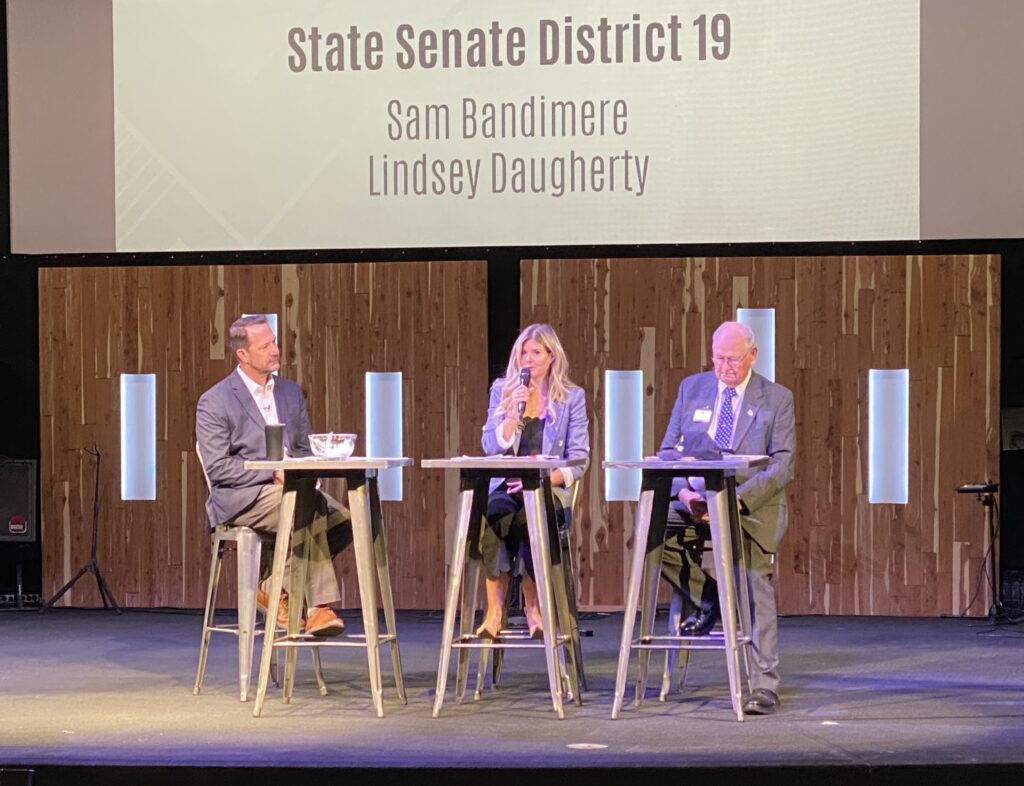
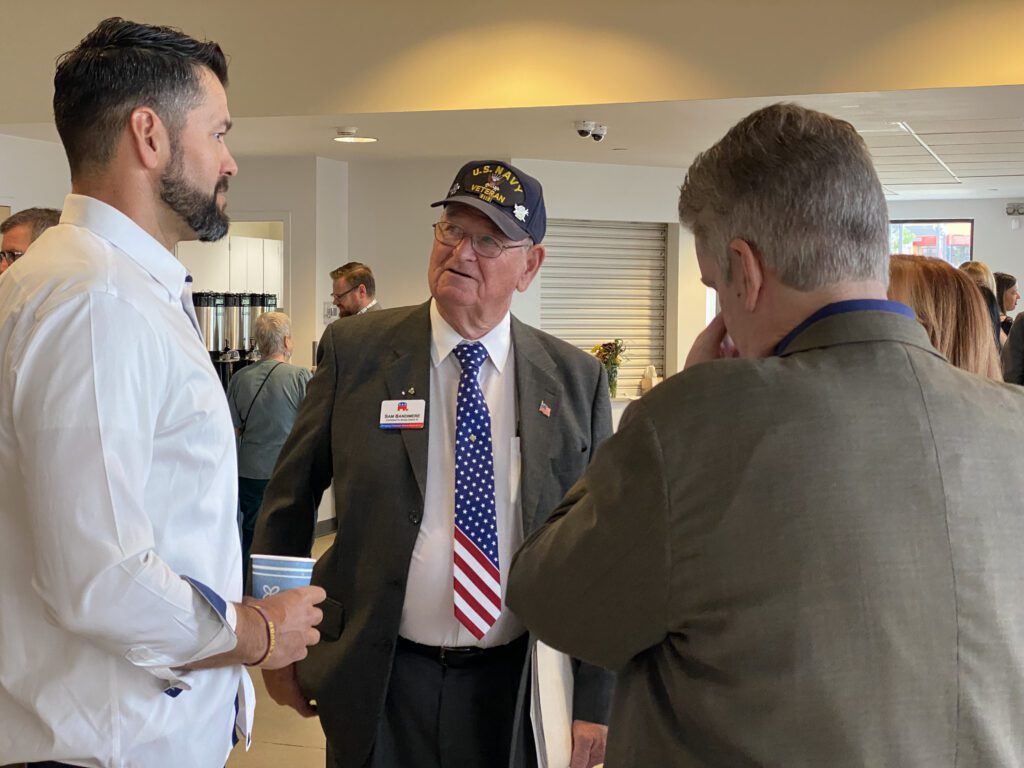
Lindsey Daugherty (D)
Forum opening statements:
“My name is Lindsay Daugherty. I am the current state representative for House District 24, running to be your next state Senator for Senate District 19. I am proud to have grown up in Colorado, went out of state to play soccer in undergrad, and came right back to Colorado to further my law degree at the University of Denver. I’m proud to have experiences in the House, the Senate, and the White House where I learned that I love policy, which is part of the reason I’m here today. I also opened up my own law firm specializing and juvenile family and some consumer protection work. Specifically, I’ve been a guardian ad litem, representing abused and neglected children in the past 10 years. I have a husband, Alex, who’s an emergency room physician, and we have a baby boy, Theo, who is 15 months old. I’m proud to have been chair of the Health and Human Services committees in the legislature. I’ve also been on the judiciary, finance and appropriations committees. I hope to build on the four years that I have been there in the state Senate by working specifically on juvenile youth issues as well as increasing transparency in healthcare and also listening and being an ally to our small businesses. Thank you.”
Sam Bandimere (R)
Forum opening statement:
“I grew up in a Colorado where the American dream was alive. And it’s my desire and purpose to restore that dream for our future generations. I enlisted in the Navy at the age of 17, served 2 tours in Vietnam, and I am proud to say that I am a veteran. I’m running to restore fiscal responsibility and limited government to Colorado. Specifically, my priorities are to repeal that Colorado bag law and get the convenience of being able to go shopping. I want to reduce and control property taxes and eliminate state taxes masquerading as fees. I want to encourage the development and adoption of a net zero energy program to reduce our carbon emissions and the current loads on our electrical grid. My home is a net zero. I want to repeal laws and regulations that hinder the development of Colorado’s natural gas and oil production. So I’m asking for your vote.”
What are your top priorities for improving public safety?
Daugherty: “I think that ensuring that the Police Department has resources and the technology and the funding to be able to do their jobs well is really important. I’m proud to be the candidate in this race that’s endorsed by the FOP. And I think that’s because of all the work that I’ve shown to do with them at the capital. I also think there are very simple things we could do, such as making sure that there’s good lighting in our in our public spaces. You know, that’s something that I actually hear a lot about and I think it’s it would be a really simple fix. So I’m happy to move forward with those types of things. I think investing in mental health resources that are comprehensive. Those are all things we can do to help with our public safety.”
Bandimere: “Public safety obviously is very important and I think one of the things that we’ve got to look at is our immigration issue and the violence that that’s bringing to us. I would be for declaring Colorado and legislating Colorado as a non sanctuary state and whenever we have a a situation where one of those commits a crime we need our police and ICE to work together. I also would advocate for supporting our police departments.”
What is your assessment of the compromise bill, HB24-B1001, which was passed during the special session? Do you believe it strikes the right balance between providing property tax relief and maintaining local government funding?
Daugherty: “We’ve had a lot of questions about the special session and that particular bill that was a bipartisan bill that is going to save folks $255,000,000 going forward. I am proud of the collaboration and the efforts that we went to good governance by listening and reacting to what both sides of an issue say. And I think we were there doing just that during special session. So I’m really proud of the work that we’ve done. I’ve personally been contacted by some businesses in Arvada, who have thanked us for saving them some money. So I think it was a good outcome. I was proud to be part of that process and I hope we continue the dialogue and the discussion as we did for that.”
Bandimere: “I don’t know how you can say it went far enough. I don’t know about you, but my property taxes on my home went up over right at $1,000, and yet they’re saying we’re going to get $100 back. I don’t think it went far enough. So I would take another look because the other thing they did in that session is they also provided for a 4% increase over the next five years. That’s a 20% increase that you’re going to experience in the next five years. Is your income going to go up 20% in the next 5 years? I don’t think so. And then they said we cannot vote on it after that. So I don’t see how they can look the the taxpayer in the eye and say they did a good job.”
How would you approach balancing commercial residential and open space developments?
Daugherty: “I think the keyword there is balance. I think that is something that we all strive to do. I know there are folks on each different side of those issues with their own interests, and I think what’s most important is getting those folks and having a real dialogue about what can work for everyone. That’s how I try to run my legislation at the capital. I think listening is incredibly important and getting the right folks to the table. And so whatever we can do again to collaborate and balance these types of issues is what we should be doing.”
Bandimere: “I don’t think the state level should be mandating down to the county and city levels what they should and shouldn’t be doing. But as far as my personal experience in that, I did a land development along Ward Rd. over here about 52nd Ward Rd. years ago. I developed a little over 160 acres, of which I saw to it that about 60 acres of that became the Ralston Valley open space down through. So I do believe in open space and that. The proper planning needs to be done, but that should be done at the county and the city level.”
State House – D24
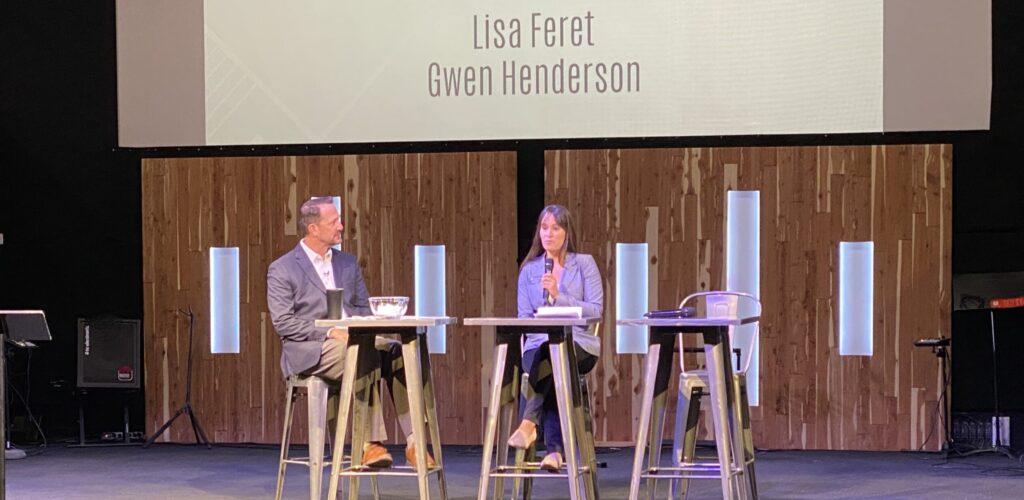
Lisa Feret (D)
Forum opening statement:
“My name is Lisa Feret. Very excited to be here. I’m your current Arvada City Council member and I am running for State House. I’m a former military veteran. I was a police officer for about four years, then became a social worker. I was a veteran transition counselor at CSU and then became a case manager for elderly, blind, disabled and low income individuals. I really burned out from being a case manager. It’s really hard to be on the ground and in the trenches working with such vulnerable populations. And I realized a lot of those policies were not working for them. So that’s kind of how I pivoted towards policy. I also spent about a decade working in disaster relief and humanitarian work. So I’ve deployed to fires and floods all over Colorado and done a lot of international work with immigrants and refugees. I love being on Arvada City Council, but my bread and butter, in my experience, is around Human Services and that is why I’m starting to run for State House. I think I can do a lot of great work around healthcare, housing and public safety.”
How would you enhance collaboration between educational institutions, employers and workforce development agencies to better align skills training with industry needs?
Feret: “This is really important. We’re seeing a shortage in workforce and specifically in skilled trade work. So there is a lot of work we can do in terms of community partnerships. We need to strengthen our apprenticeship programs and our internship programs every semester. I partner with CSU and I take on two or three social work interns that want to work and learn policy. That’s just one nugget that I’m doing personally because I think we need more social workers in the policy arena. But I think there’s a lot of room for apprenticeship and internship programs to expand. There are ways that we can streamline the way businesses partner with healthcare or with organizations. And I think there’s a lot of room for streamlining some of the ways we apply for those processes to make sure it’s easier for businesses to have apprenticeship and internship programs.”
What policies or initiatives would you support to increase the availability of workforce housing?
Feret: “So I don’t think people know that 75% of people on public service and assistance programs actually have someone in the household that’s working. That’s telling you that people cannot afford to live here. 75% is huge. That is fundamental in the policy work that I’m looking at, but specifically when we look at building out affordable housing, the programs that we have allow for people to only stay in affordable housing. It is too hard for them to get out of social service programs because of the way that our programs are structured. I would like to see a way that we can shape our Health and Human Service programs to allow and empower people to get out of affordable housing, which shores up more room for affordable housing units for some of our workforce that need it.”
What specific policies or initiatives would you propose to support small businesses in the region?
Feret: “The theme that I have heard is red tape. There are a lot of policies that are passed at the state level that are blanket for businesses and there is a range of business sizes and business styles that I don’t think is one size fits all. I had just heard from a previous Chamber event earlier this week how it takes one staff an entire day to file for their state taxes. And it’s just too complex and too challenging. So I would love to look at what we’re requiring from our businesses and where can we streamline the reporting and application processes.”
State House – D27
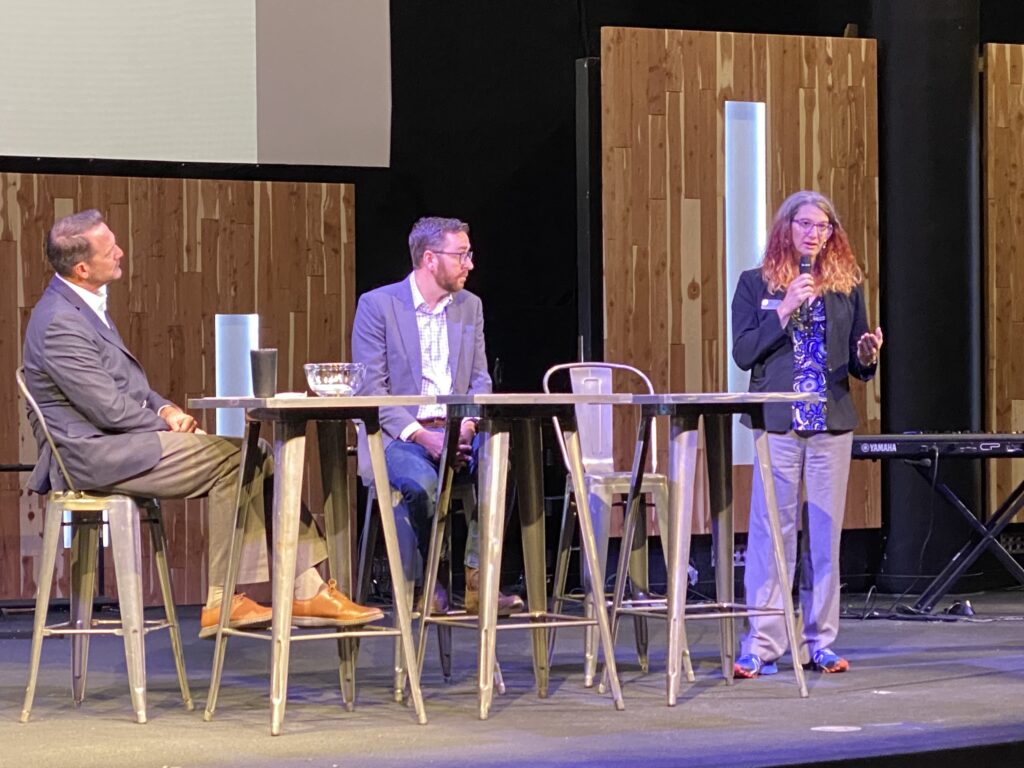
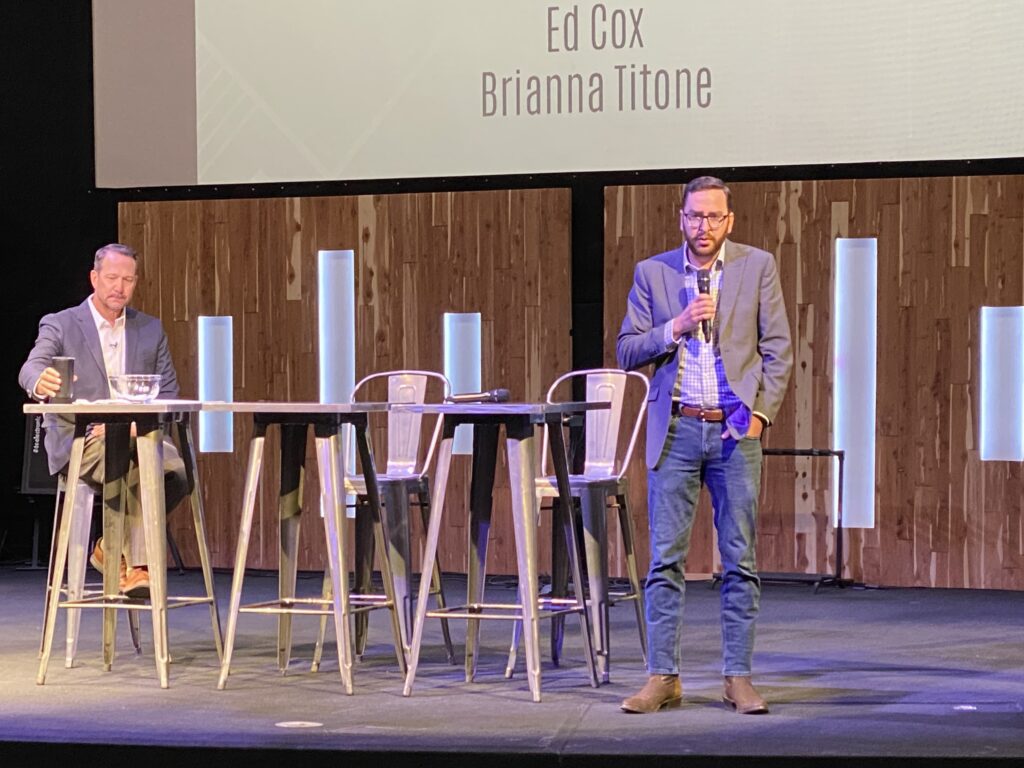
Brianna Titone (D)
Forum opening statement:
“It’s good to see everybody. Thank you very much for having us here. This is one of my favorite events. I’m Brianna Titone. I represent House District 27 and never thought I would ever run for office. I’m not steeped in government. I had a skepticism of government for a long time and when someone asked me to run, I thought about it really hard and I realized, you know, because of my service to my community and my values of service melded well with this job I want. I was a volunteer firefighter at age 16. I want to help and serve the community. This is my past. When I first ran for office, knowing the community, knowing what people wanted, was the priority that I had. I don’t have an agenda. My agenda is to the service of the people who I represent. I like the two year cycle. I can find all of the things that people are talking about and then start to work on those issues. I’m a problem solver. I want to solve the problems that we have in a smart way. As a scientist. I bring a lot of that knowledge and data to the table. I’m not easily duped by the lobbists and I think that that really works well for the people because you get a decision and a vote that’s informed. And that’s what good government is.”
Ed Cox (R)
Forum opening statement:
“Hey folks, thanks for having me and thanks for being here tonight. My name is Ed Cox. I’m running for HD27. I cut my teeth working in the United States Senate for Senator Orrin Hatch as a senior adviser and I had the opportunity to help write and pass legislation in the United States Senate on a bipartisan fashion. I am really proud of the accomplishments there. I learned how the sausage was made. I ended up moving to Arvada in 2019. My wife is an Arvada native. I’m from southern Utah. And I had the opportunity to start a small business when I got here and I realized in short order, some of the difficulties that small business people have, some of the red tape that you experience. Some of the reporting requirements starting a small business is one of the hardest things you’ll ever do. And I just felt like with some of the challenges that I had, that every time the legislature got in session, it wasn’t a matter of if things were going to get easier. It typically got harder. But beyond the small business world, I have 3 kids that are the under the age of 6 and one of my top concerns is the cost of living and housing affordability. I want our children to be able to choose whether they want to stay in this state and not have to make a decision to leave based on economics and their inability to buy a home. It’s a huge concern of mine and if I get to the legislature, I want to make, I want to advocate for policies that make it easier for people to get into a home, make it easier for the little person to start their own small business. And work with my colleagues on the other side of the aisle to accomplish this.”
How would you balance funding various community needs while maintaining fiscal responsibility?
Titone: “I was the President of my HOA and we had a budget and we had goals. We had priorities, we had expenses and that experience for me was really eye opening. I was able to find a lot of things that we weren’t doing right that we could save money with that we could find efficiencies that we could do things to prepare for the future. And those are things that I think are really important for Colorado. We don’t know what we don’t know. We can’t expect everything. We have to be prepared for what’s to come. Having a budget that is balanced as we have is great, but sometimes we need to be able to pivot and address the issue at hand and that is something that we need to think about. And how do we prepare for that? That is my priority.”
Cox: “This is a fantastic question. Your job as a legislator is to take a hard look at the budget and there are many priorities out there. But what we have seen is an increase of spending from our state legislature year over year. And I don’t feel that as a result of that increased spending that we all feel like we’re driving on better roads. That we have better infrastructure. I truly don’t feel that we have a lot to show for it. So your job as a legislator in the appropriations world, if I were to go there, I would tackle infrastructure, public safety and education, and we need to take a hard look at all of those and make sure we’re doing the right priorities and not just spending money on pet projects.”
What strategies would you support to improve wildfire prevention and mitigation in our area?
Titone: “This is this is an an area that I very passionate about, being a volunteer firefighter. I’ve talked to several of the communities up in the mountains. This is a great question for HD27. There are a lot of things that we can do at the state level at the county level and work with the federal government. We need to work at all different levels to find the funding and the people that do this work and then come up with creative solutions that may cost less that we can piggyback on to keep our community safe. Safety and lowering property casualty insurance values is really important to me and that’s something that we can do together.”
Cox: “This is an issue I’m passionate about as well. I worked on it a lot in the United States Senate. First and foremost is forest managers. We’re not managing the forests like we should. A lot of them are being overgrown. We have dead trees. We have difficulty getting in and removing some of these dead trees. In fact, the canopies are growing so close that very little water is penetrating to the soil. They’re landing on the canopies and they’re, they’re evaporating. That’s number one. Two, we need to be using data-driven approaches to tackling this. We can leverage AI so we can see smoke as it’s happening. And three, we need to be supporting our first responders on the ground, making sure that they have the adequate tools and resources they need to respond to these fire. Because I lived very close in the Candelas area next to where the Marshall Fire was. And so it was very personal for me. I’ll work to address this if if I’m sent to the state legislature.”
How would you work to make our region more business friendly and attractive for new companies?
Titone: “I think the railroad project is something in Arvada that we need to think about. There’s a lot of economic benefit there. But I think it really comes down to making sure that we have an adequate workforce. And the housing available for the people to do the work. This is something that we need to collaborate with the chambers and the community colleges, and our local colleges. There’s a lot of programs we can use. My program on teacher externships will help. Get students to find out what businesses are in the area that they could work at. So there’s a lot of things that we could do that really make businesses feel like that they’ll be able to set up shop and get the people to work and do the job.”
Cox: “This is a very important question as a small business owner and having opened a small business in 2019, I actually opened the doors in January of 2020, right before the COVID closure. But at the macro perspective, we’re not seeing the state going a more competitive direction at a time where companies have choices to headquarter elsewhere, to start businesses elsewhere. The difficulties of compliance and regulation, starting your own small business, is going to be the hardest thing that you ever do. And you’re going to have so much on your plate. And I want the state legislature to figure out ways that make it easier to run these businesses. We’re declining in our rankings when it comes to business competitiveness. We’re declining in manufacturing jobs and we need to be looking at red tape. We need to be looking at compliance and and other issues to figure out how to make it easier to do business in the state and property taxes is another thing we should be looking at.”
Jefferson County Commissioner – D1
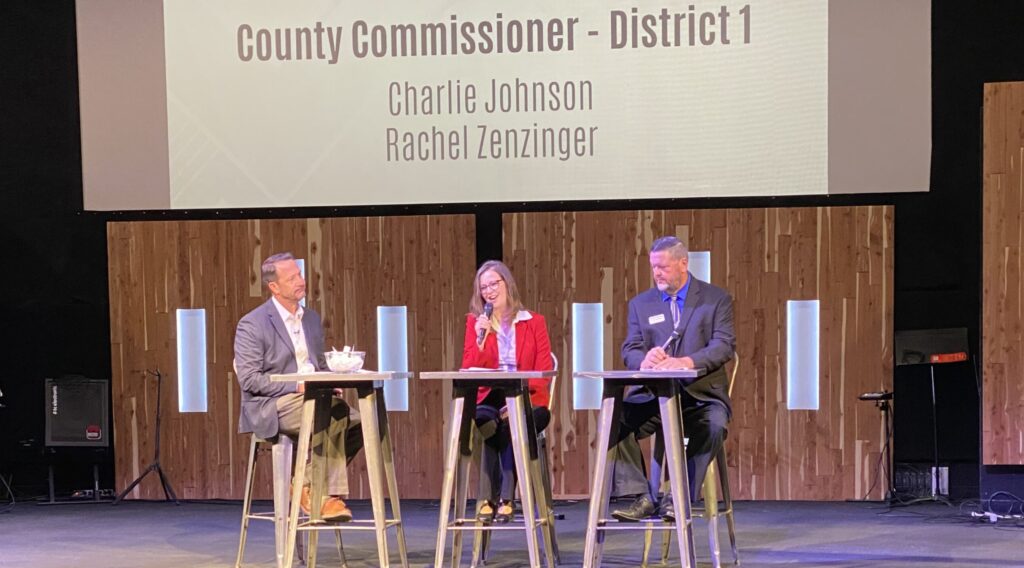
Charlie Johnson (R)
Forum opening statement:
“My name is Charlie Johnson and I’m not a politician. I’m a truck driver. I’m a retired law enforcement officer and currently I’m teaching tractor-trailer driving instruction down at Wheat Ridge, where we teach veterans and locals alike a new job path, a new career to enter the workforce.
I got into this race because I’ve been here since 1995. I met my wife, fell in love with Colorado and my wife, and we raised our son here, who just graduated college and is working in the Arvada area. Things have changed a lot since 1995.
I went down to our jeffco chair and when I found out we had a opening for County Commissioner, I went down and gave her 10 reasons why we should find a good candidate, and I walked out and it was me. So here I am, folks.
I’m running on three major issues. One is our illegal immigration, which is costing Denver upwards of $150 million, and I believe it’s going to bankrupt Denver. And I think we’re well on our way as well-being former law enforcement, I want to support our County Sheriff and all law enforcement in Jefferson County.
To reduce the crime that we’re seeing, I want to bring back qualified immunity for those officers who can do their job without being afraid of frivolous lawsuits. And finally, my third platform is Tabor. I believe the taxpayers Bill of Rights is important. I’m hoping to make sure that we vote no on that and get our tax money back.”
Rachel Zenzinger (D)
Forum opening statement:
“I’m Rachel Zenzinger. I’m asking for your vote to elect me to the Jefferson County Board of Commissioners. You already know that I have a long history of public service in the community. First as a teacher, a city councilor, and more recently as a state senator, where I had the privilege of chairing the Joint Budget Committee.
I’m running for Commissioner to provide real results to the people of Jefferson County. I am a proven leader with a track record of success now. Years ago, I ran on the 3E’s: education, the economy and the elderly, and I delivered on those issues. But I believe this race is less about issues and more about values.
So I’m running on the three C’s: collaboration, commitment, and courage. First, I believe that collaboration is the cornerstone of democracy. I had a 100% bipartisan record 8 out of the 9 sessions that I served. Second, commitment: for nearly two decades, I’ve demonstrated my commitment to the constituents in my area by solving problems and tackling big challenges. And lastly, courage. I believe that effective leaders must have the courage to push boundaries, resist, resist groupthink and put aside partisan politics so that we can get things done.
I’ve proven my willingness to be courageous at the state Capitol and I will bring that level of integrity with me to the Jefferson County Board of Commissioners.”
Eric Bodenstab (U)
Forum opening statement:
“I’m Eric Bodenstab and I am running for Jefferson County Commissioner – as part independent, part third-party, to help address needed electoral reform for our county and beyond. I also am in support of a massive overhaul of the Metro District system of land development that has come to dominate our state’s process. I would like to see Jeffco become more democratic with a new and better system of proportional representation. It is too long to give you a full 30 or 40-minute presentation which is often necessary to educate a person on this. But the basic idea is that if a party takes 27% of the vote, then they will get 27% of the seats. This ensures voter intent and removes 95% of wasted votes. A good primer of this system can be found at BestDemocracy.org.
I work as a structural engineer (10+ years), with emphasis on bridges and parking garages. I have worked for 4 years as a hotel reception clerk, 4 years as a Colorado/licensed Substitute teacher in Aurora Public Schools, and 2.5 years in the stock brokerage industry in San Diego (NASD/NYSE 7 & 63). I understand industry. I also worked with Denver Juvenile Probation as Day Reporting Officer and GED Instructor for several years in the early 2010’s while I was getting my MS degree at CU Denver.
I am married with two boys, 9 & 6.”
What are your top budget priorities for our region and Jeffco in the coming years?
Johnson: “For one, I think our budgets should be clearly looked at. Two things that I do not want to cut is our Jefferson County Sheriff’s Office and our roads and bridges. We had the latest study here by Bighorn Company and the voters have spoken There’s four or five items that everybody is in favor of, one of which is our road and bridge department needs to be funded and crime is a big issue. So I would look at all other departments and I would look to see where we can trim them. First, I think we need to see what essential services have to be done and then each department after that for me, I would ask them to look at cutting 1 to 2%. And let’s take a look at it and if it’s feasible, I think we should cut the budgets and fund things that people agree upon.”
Zenzinger: “My number one priority is budgeting. I have a lot of background and experience in that, having served on the Joint Budget Committee for the state where I balanced the $40 billion budget in both good times and in bad and every year. We came up with the balanced budget that met the needs of Colorado at the county level…we have a very large county. We are the 4th most populous county in the state and so we have a lot of competing needs and it’s going to take someone who knows how to prioritize, which is what the main job of a county Commissioner is: to provide prioritization within the budget. My three top priorities within the budget would be transportation and infrastructure, affordable housing and wildfire mitigation, and public safety.”
Bodenstab: “Retool Metro District revenue, such that more stays with the community and less is syphoned off by out-of-state investors. A personal project would be (with the other commissioners approval) the creation of more deep water (6+ feet) pools for a good game of water polo.”
What is your philosophy on business regulations? Are there any specific regulations that you would seek to change?
Johnson: “I’m a big fan of letting businesses be businesses. I think government intervention typically slows down small businesses. I would look to lessen our regulations, our permitting process. Basically, I want to allow small business to be small business. If we can help them out with tax breaks, things of that nature, that’s what I would look to do. But I believe that less government is better. I’m always for smaller government, so zoning issues as well. I think if we can trim the process and maybe do better zoning. And as Rachel said here, collaboration between residential zoning and commercial zoning. I think we need to look at that and see if we can use our limited zoning for limited use to make more zoning for commercial and more zoning for residential, so the two don’t mix as much. I think that’s becoming a problem here in Jefferson County.”
Zenzinger: “So my philosophy is you have to strike the right balance. On the one hand, regulation helps protect the employees and consumers. But on the other hand, if it’s overly compliance-driven, then you can stifle innovation and you can slow down operations or increase costs. I really garnered a reputation down at the Capitol for my common sense approach as a moderate who navigated the right balance between regulation and over regulation, and I pushed back on bills that I felt took things too far. I was even recognized by the Common Sense Institute and the Colorado State Chamber as their business. Defender of the year last year for that approach.”
Bodenstab: “As long as you don’t interfere with another’s constitutional or legal rights, business should have liberty and only the necessary ethical and environmental regulations.”
What strategies would you implement to address workforce shortages and skill gaps in Jefferson County?
Johnson: “I have first hand experience on this question. I am a tractor trailer driving driving instructor here in Wheat Ridge. So we are in the transportation field, we work with workforce programs throughout Jefferson County to provide scholarships to people to come in, and I’m all in favor of that. We put people on their feet with new job instruction in the tractor trailer business and they go out and get a good job. So I’m in favor of workforce workforce programs like that. I also would look to our higher education and things of that nature to where we have internships. I’m a college graduate and I had to do two internships in the hospitality field and hotel. I had to do one in the hotel field and one in the restaurant field. I think we should work with our higher education to maybe have some mentoring programs like that to maybe drop all the electives and maybe do some real world applications and mix the small business community in with that so we can all benefit.”
Zenzinger: “This is an area that I have a lot of experience in at the state level, particularly with regard to apprenticeships, stackable credentials and work based credit. More recently, I was inspired by a conversation that was hosted by the Arvada Chamber with the President of Red Rocks Community College. We talked a lot in that group setting with a mix of business owners, county leaders, local leaders about how we might be able to collaborate more with one another so that we can achieve that specialized training and expertise that our workforce. needs. In fact, if you just look at the new Quantum hub here in Arvada, it’s a really good example of how we can partner with our higher education institutions. I think of it as a three legged stool and the county can really be a good partner with that. With regard to our workforce development centers that we have and making sure that all three legs, education, business and the county government, can work together.”
Bodenstab: “I would continue to promote the Jeffco Business & Workforce Center, along with other community resources for our county’s betterment. I would see what additional trainings (at the request of the Chamber and other civic/business-minded organizations) are most needed, and look to fund those.”
Jefferson County Commissioner – D2
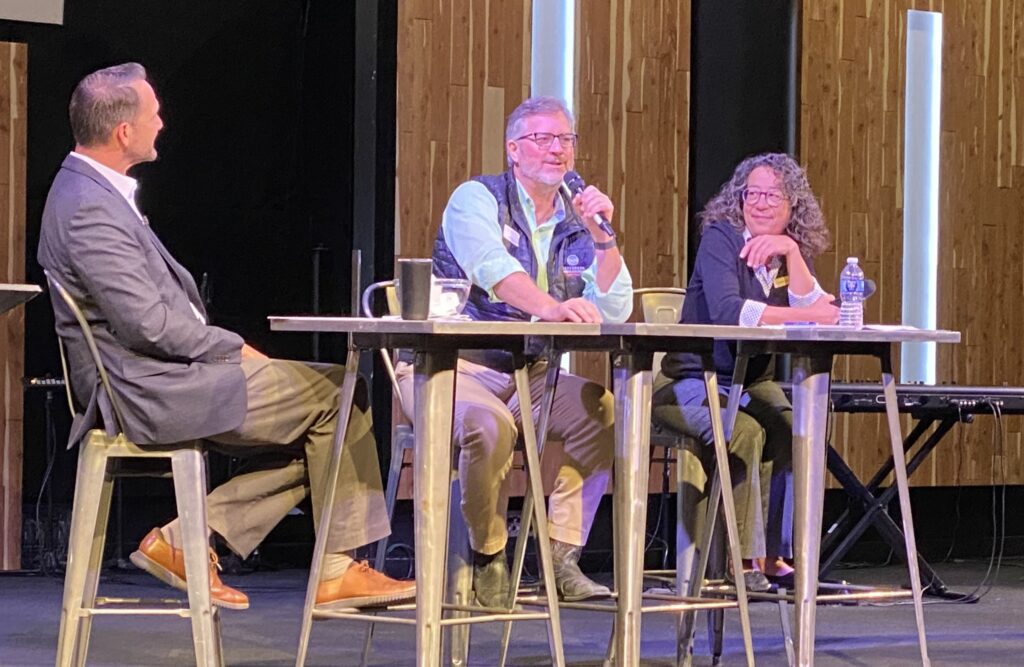
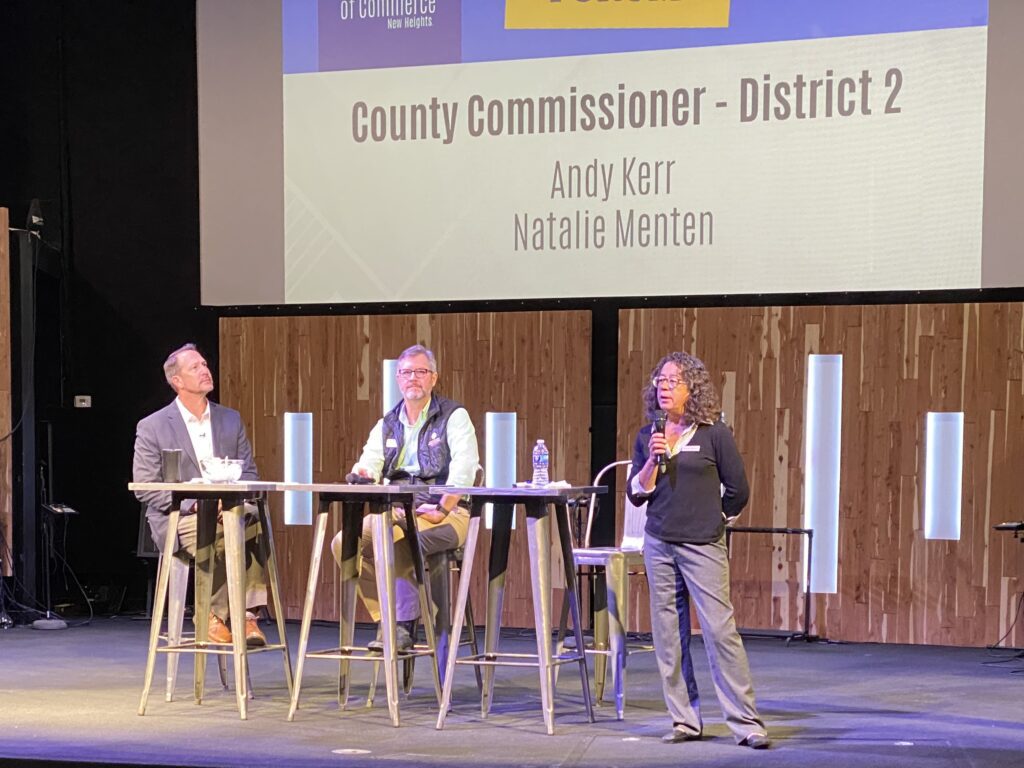
Andy Kerr (D)
Forum opening statement:
“My name is Andy Kerr. I am the current County Commissioner for District 2. I know so many of you because I’ve had a lifetime of public service. I grew up here in Jefferson County. My wife grew up here in Arvada and graduated from Arvada High School. I graduated from Green Mountain High School. We raised all three of our kids here through Jeffco public schools, and I was a career long social studies teacher. I also want to let you know about my service, my public service at the state capital. I spent six years in the House, six years in the Senate, six years in the minority, six years in the majority. Varied experience down there, but it gave me the background to come and be your county Commissioner running for reelection.”
Natalie Menten (R)
Forum opening statement:
“My name is Natalie Menton. I’m here to talk to you about the experience that I have, and the public policy that I’ve worked on. I have a background in small business. I can tell you that not only as co-owner but also an operator and automotive industry, I’ve put in the work and can understand what business owners face and the challenges today and how much government policy can create hurdles. My experience as an elected official and as also as a policy advocate is because I was a small business owner. I wanted to go down to the state capital and keep an eye on those 700 bills being run through at a rapid rate that affect your lives. I spent eight years on the regional transportation district as an elected board director. I went in being known as a government watchdog. I looked at proposals with deep evaluation. Rubber stamping policy was not in my method of operation. I hope I earn your vote.”
What changes, if any, would you propose to current zoning and or land use policies in Jefferson County?
Kerr: “Right now the county is doing a comprehensive look at zoning and other regulation policies called Together Jeffco. This is a multi year multi step process involving all the entities or municipalities, in the county. But also most importantly, listening to the voice of the people of Jefferson County, there have been multiple opportunities, forums and still opportunities online to give back and we’re going to listen closely to what the people of Jefferson County have to say about zoning and other regulations, making sure that we are meeting the needs of the people of Jefferson County.”
Menton: “I believe my work would start immediately at the state Capitol, where the governor and some other legislators have been very driven to hand down heavy-handed legislation mandates zoning changes, taking away local control, and they need to we think we need to have a good advocate at the state capital, and I expect to do that just. As I have for the last two to three decades.”
How would you ensure local businesses have a voice in policy decisions that affect them?
Kerr: “Again, going back to the Together Jeffco process of reaching out, not just individual citizens, but also our small businesses, our nonprofits and municipalities within Jeffco are all a part of that process. Listening and making sure that anything that we have moving forward listens to the voice of folks here in Jefferson County. I think it’s important to note that Jefferson County has our Economic Development Corporation that Jeffco EDC Commissioners are board members on that board. We meet on a regular basis with businesses from throughout Jefferson County, hearing their concerns, hearing what they would like us to move forward on.”
Menton: “Board meetings generally occur Tuesday at a 9:00 AM meeting. I think it makes common sense to start by moving these public meetings to an evening event where the public, not only citizens, but businesses, are able to attend after they’ve closed the shop for the day. Because just getting to the meeting room is an important step forward.”
What transportation infrastructure improvements do you believe are most needed in Jefferson County?
Kerr: “You know right here in the Arvada area, certainly the north-south transportation routes need enhancement. Jefferson County is interesting because we’re mostly within Jeffco are looking at north-south routes, but we are a major east-west route. For people east of us, going to the mountains and people to the west of us, going to Denver and other locations. So we really need to work together with our municipalities and our surrounding counties. I have a lot of experience working with those municipalities and also the other counties to make sure that we have a transportation system that makes sense for us, but also the folks who are traveling through Jefferson County.”
Menton: “I think we should talk about the money first and that is both the federal government and state government have diverted money that we’ve paid for in gas taxes to go to pave and fix our roads. Part of those funds are being diverted. First thing we do is start to make sure that what we paid in is going into the roads themselves. Then address the top priority issues that we’ve got.”
Jefferson County Voter and Election Resources
Key Dates of 2024 General Election
- Sept. 21: Military and overseas ballots mailed
- Oct. 14: Local ballots mailed, drop boxes open
- Oct. 21: Vote centers open
- Nov. 5: Election Day
Voter Resources
- Register to vote
- Track your ballot
- Jeffco voter information (voting locations, see what’s on the ballot, learn about election security, and more!)
Upcoming Advocacy Events
- October 10: Advocacy After Hours at Odyssey Beerwerks
- October 16: “All About The Ballot” Webinar (Watch Webinar)
- October 18: State of the Region
Ensuring our elected leaders effectively represent business interests in legislative and policy matters at the local, regional, state, and national levels is a priority of the Arvada Chamber through the B.O.L.D. 2026 initiative. Throughout the year, the Arvada Chamber facilitates local and state elected official engagement with our business community through programs like the Candidate Bootcamp, Advocacy After Hours, and elected official spotlights in our Advocacy Action newsletters.
The Arvada Chamber of Commerce does not endorse candidates at any level but is grateful for the participation of all the candidates and local officials to further develop a critical dialogue within the region to help ensure success for all involved. Learn more about the Arvada Chamber’s advocacy efforts at arvadachamber.org/advocacy.





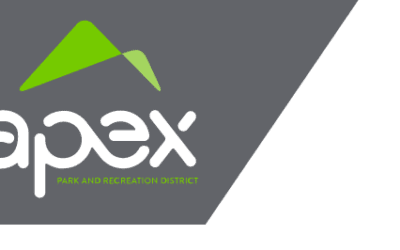
0 Comments